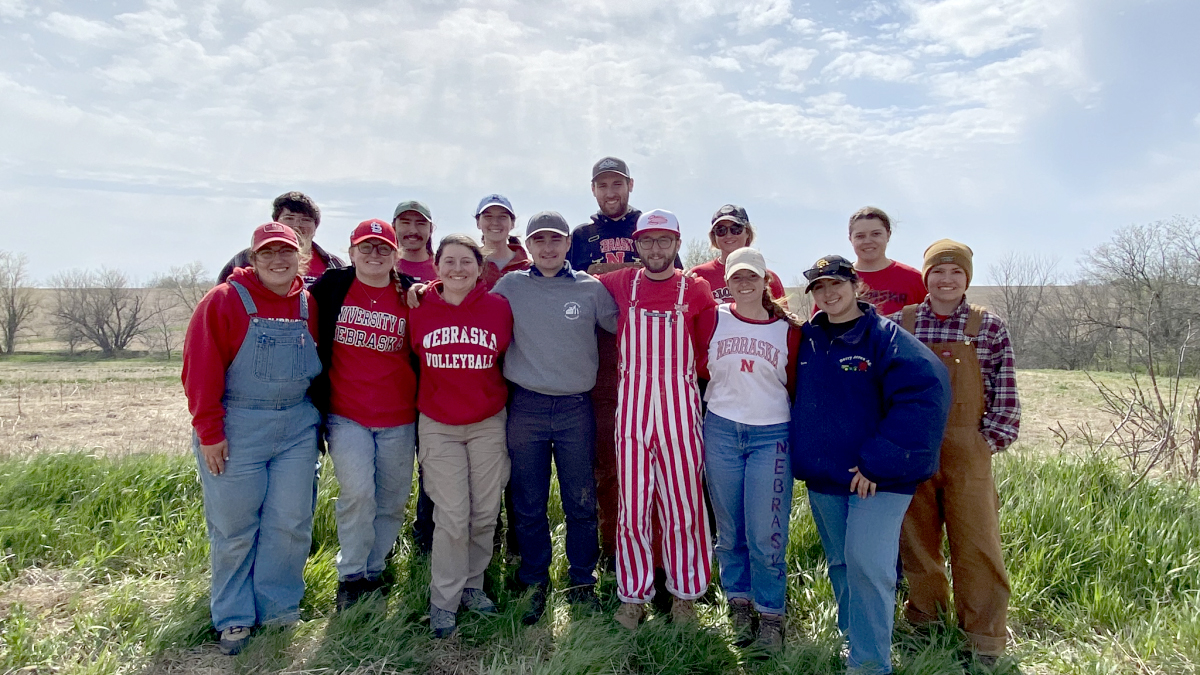
by Emily Eilers | IANR News
The University of Nebraska-Lincoln Soil Judging team took home six awards this year from the National Soil Judging Contest hosted by Iowa State University in Ames, Iowa.
UNL won second place overall team, first place in team judging, first place alternate team, third place individual (Mason Rutgers), first place alternate individual (Adrian Cox) and second place alternate individual (Rachel Clarkson). UNL Soil Judging has qualified for nationals every year since 2016 and received awards or recognition in 2019, 2022, 2023 and 2024.
Student who participate in soil judging learn to identify different soil types, evaluate their composition and other characteristics, and interpret soil information for a variety of uses including agriculture. In the process, they develop a deep understanding of an appreciation for soils and how they form.
“I always describe soil judging as competitively playing in the dirt,” said Mason Rutgers, a member of the UNL team majoring in agronomy. “Teams of students from across the country get together in one part of the country for a week and spend time learning about the soils of the region. We describe soil properties like color, texture, and structure and then make interpretations on water movement, cropping suitability, and engineering.”
This was not Rutgers's first successful trip to the national contest. Rutgers placed 33rd at nationals in 2022, sixth in 2023, and third this year.
“Placing third this year showed that I am continually improving my skills as a soil scientist and getting the wonderful opportunity to learn more about the world we live in,” Rutgers said.
Coaches Judy Turk, associate professor in the School of Natural Resources, and Becky Young, assistant professor in the Department of Agronomy and Horticulture, had of team and individual achievements this year to be proud of.
“I was so proud and excited for the students, as they worked so hard throughout the semester and during the practice week,” Young said. “It was great to see both new and veteran team members win individual awards and to be there to see the support and happiness their fellow team members had for them.”
Team members include College of Agricultural Sciences and Natural Resources students Charlotte Brockman, Julianna Canedo, Rachel Clarkson, Adrian Cox, Will Hernandez, Stephanie Kluthe, Jack Krebs, Nathan Kufner-Rodriguez, Claire Nalty, Anna Newcome, Natalie Robbins, Mason Rutgers, Mason Schumacher and Madi Stock.
“We’re fortunate enough to have the opportunity to mentor students who are excited and interested to learn about the nuances of soil formation and morphology and its connections to land-use suitability and new landscapes, and also voluntarily brave cold, hot, rainy, and/or windy conditions for several long days at a time, to do so,” Young said. “It's also great to have the opportunity to watch them work together and learn new techniques or ways of thinking from each other and to grow individually and as a team overtime. The hardest part is saying goodbye to groups of graduating seniors that have been a part of the team for two or three years.”
At this year’s national contest, 205 students from 25 teams across the nation spent four days practicing in the Iowan soil pits from 7:30 a.m. to 5 p.m. Contestants also participated in a geology and area overview lecture as well as attended an all-teams banquet before the scored judging days. On the first day of scoring, contestants worked through three soil pits individually, and on the second day, they judged two pits as teams. Awards or recognition are given to the top 10 individual scoring participants, the top three individual alternates, the top five teams, and the top five overall teams.
A lot of work goes into preparing for the national contest each year. Coach Turk and Coach Young start studying the soils and landscapes of the contest site in the fall semester after the regional qualifier. They also gather student feedback on what the students want to improve on. In the spring semester, the pair of coaches develop learning guides to help the students become familiar with the soil in the area of the contest. These guides include activities about soil features or topics unique to the contest area and texture and color quizzes to help students build on technique. Students give research presentations to share findings with the team. The team also tries to practice in the soil teaching pits, weather permitting.
Participating in soil judging helps students connect concepts in the classroom to what they have experienced in the field.
“Soil judging has been the most important part of my college career,” Rutgers said. “As a kinesthetic learner who loves being outdoors, being able to feel and describe the properties of soils that we learn about in the classroom has significantly increased my understanding of soils.”
For some students, soil judging can lead to undergraduate research or new career interests.
“Soil judging has also been a segue into undergraduate research for me,” Rutgers said. “I've completed two soil-focused projects with Judy Turk, one of our team's coaches, as my advisor. I presented at last year's Soil Science Society of America annual meeting and won a few awards for my work.”
Rutgers will pursue a Master's in Soil Science at Michigan State University where he will also get to coach the soil judging team and continue soil research.
“Soil judging is an excellent experience for those who enjoy spending time outdoors and learning about the ground at our feet,” Rutgers said.
The team is grateful for the support from the departments, college, alumni, and friends that allow them to continue to have impactful field experience and networking opportunities.
More details at: https://go.unl.edu/xung